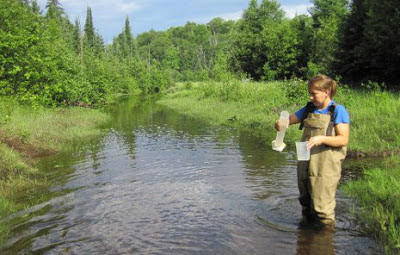By Jennifer Donovan, Michigan Tech Director of Public Relations
Posted on Michigan Tech News May 21, 2013
Reprinted in part with permission
Undergraduate Faith Lambert samples Hills Creek water upstream of the main stamp sands restoration site. Located northwest of Calumet and Ahmeek, Hills Creek eventually drains into Lake Superior. (Photo courtesy Michigan Technological University)
HOUGHTON -- Two Great Lakes restoration research projects by Michigan Technological University researchers are among 12 selected for funding, the University of Michigan Water Center announced today. Fifty-four research teams from universities near the Great Lakes and beyond submitted proposals for nearly $570,000 total funding.
"Michigan Tech should be very proud of its Great Lakes researchers," said Guy Meadows, director of the Great Lakes Research Center (GLRC) at Michigan Tech. "These grants are a recognition of their outstanding abilities, and their work will produce critically needed data to improve our restoration efforts on the Great Lakes."
A team led by Amy Marcarelli, assistant professor of biological sciences who also works with the GLRC, received $50,000 to study the impact of remediation of stamp sands along Hills Creek, northwest of Calumet and Ahmeek on the Keweenaw Peninsula. David Dean, assistant research scientist at the Michigan Tech Research Institute (MTRI) in Ann Arbor, heads another Michigan Tech team that received a $50,000 Water Center grant to develop a geospatial database to inform response plans for dealing with oil or chemical spills in the Great Lakes.
Marcarelli’s co-investigator is Casey Huckins, associate professor of biological sciences who also works with the GLRC. Dean’s co-investigators are Colin Brooks and Arthur Endsley, both research scientists at MTRI in Ann Arbor.... Click here to read the rest of this article on Michigan Tech News.







































































































































No comments:
Post a Comment